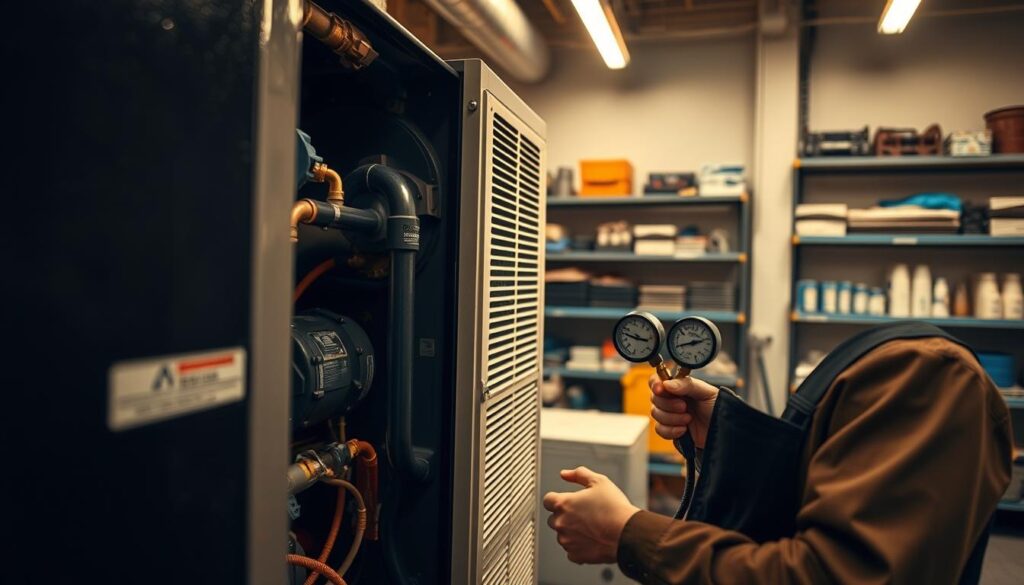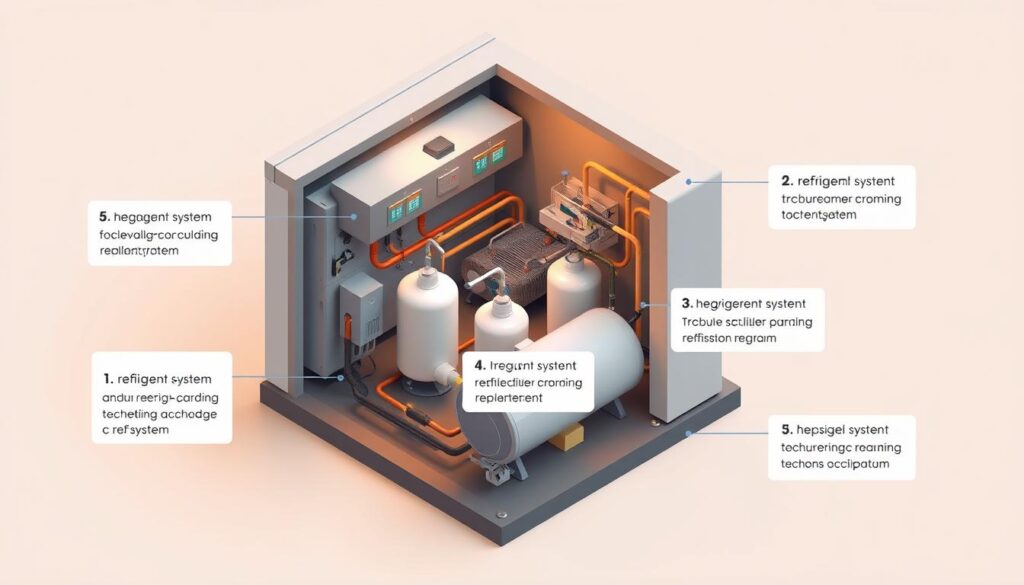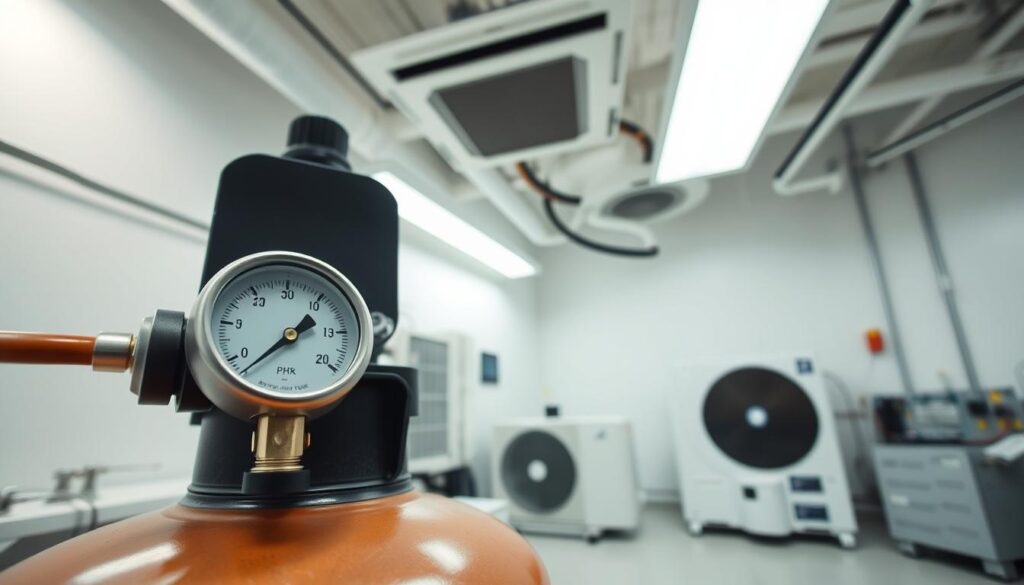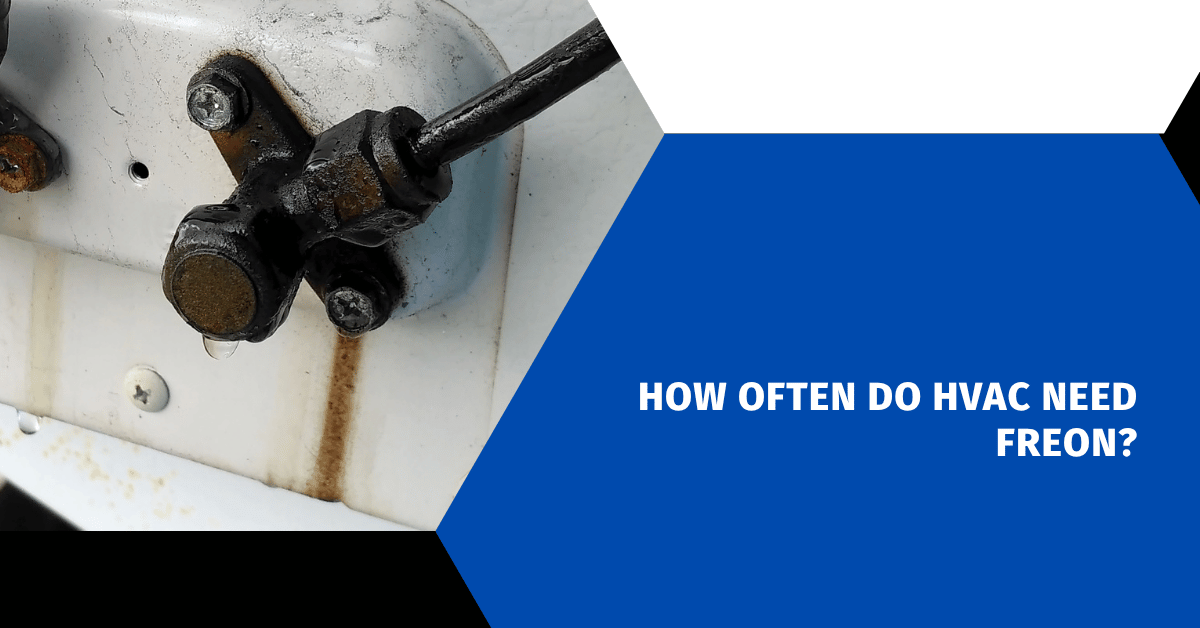Affiliate Disclosure
HVAC Guide Guys is a participant in the Amazon Services LLC Associates Program, an affiliate advertising program designed to provide a means for sites to earn advertising fees by advertising and linking to Amazon.
How Often Do HVAC Need Freon? Ever thought about if your air conditioning needs constant freon? Many homeowners don’t get how much refrigerant their HVAC systems need.

Today’s air conditioners are made to keep refrigerant levels steady. Knowing when to recharge can save you money and avoid extra maintenance.
Air conditioners are not simple machines. They usually don’t need constant freon. If installed right, they can keep refrigerant levels good for years without needing help.
Key Takeaways
- HVAC systems are closed-loop refrigerant systems
- Proper installation minimizes refrigerant loss
- Frequent recharging indicates system problems
- Professional maintenance spots early refrigerant issues
- Regular checks stop unexpected hvac freon recharge needs
Table of Contents
Understanding HVAC Refrigerant Systems and Their Operation
Your home’s HVAC system has many parts working together. At its center is the refrigerant, key to cooling your space.
Refrigerant is vital for cooling by absorbing and releasing heat. Knowing about hvac system refrigerant levels helps keep your AC running well.
The Role of Refrigerant in Air Conditioning
The refrigerant goes through a cycle in your HVAC system. It changes from liquid to gas. This change helps it:
- Absorb heat from indoor air
- Transfer heat outside your home
- Cool down your living space efficiently
Types of Modern Refrigerants Used in HVAC Systems
HVAC tech has changed, moving to greener refrigerants. Some common ones are:
- R-410A: A modern favorite
- R-32: Has a lower global warming impact
- R-454B: A new, eco-friendly choice
How Refrigerant Cycles Through Your System
Keeping the right refrigerant levels is key for smooth operation. The cycle has four stages:
- Compression
- Condensation
- Expansion
- Evaporation
Maintaining optimal refrigerant levels protects your HVAC system’s critical components and ensures efficient cooling.
How Often Do HVAC Need Freon?
Knowing when to refill your HVAC’s freon is key to keeping it cool. A good air conditioning system should never need freon added regularly. This is because the refrigerant stays in a closed loop, not leaking out.
Adding freon to your HVAC system is not something you do often. If you’re adding it a lot, it means there’s a problem. Usually, this means there’s a leak that needs a pro to fix.
- Normal HVAC systems do not consume refrigerant during operation
- Repeated freon refills suggest possible system damage
- Professional diagnosis is key for refrigerant issues
Experts say to get a full system check if you think there’s a freon problem. The right hvac freon refill schedule is zero – no refills if it’s working right.
| System Condition | Refrigerant Action |
|---|---|
| Properly Functioning System | No Refrigerant Recharge Needed |
| Suspected Leak | Professional Inspection Required |
| Persistent Low Refrigerant | System Repair or Component Replacement |
Remember, adding freon a lot is not a fix but a sign of a bigger issue. Always get a certified HVAC pro to check and fix any freon problems.
Explore Our HVAC Shop
Looking for top-rated HVAC tools, parts, and accessories? Visit our shop and find the perfect solution for your needs.
Visit the ShopSigns Your AC System May Have a Refrigerant Leak
Finding hvac freon leak signs early can save you money and prevent system failure. Your AC needs refrigerant to cool your home well. Any problem with it can cause big issues.
It’s important to know the signs of low refrigerant levels. Homeowners should watch for certain signs that might mean a refrigerant leak.
Common Symptoms of Low Refrigerant Levels
- Warm air blowing from vents instead of cool air
- Unexplained increases in energy bills
- Unusual ice formation on refrigerant lines
- Reduced cooling performance
Visual and Audible Indicators of Leaks
Your HVAC system sends out signals when something’s wrong. Listen for hissing or bubbling sounds near refrigerant lines, which often mean a leak. You might also see:
| Indicator | Potential Significance |
|---|---|
| Frost on evaporator coils | Possible refrigerant restriction |
| Oily residue around connections | Evidence of refrigerant escape |
| Visible copper line corrosion | Potential leak point |
Impact on System Performance and Efficiency
Low refrigerant levels make your system less efficient. Knowing when to replace refrigerant is key when performance drops. A system with too little refrigerant works harder, uses more energy, and can get damaged.
“Proactive maintenance is always cheaper than reactive repairs” – HVAC Professional Insight
If you see signs of a refrigerant leak, call a professional HVAC technician right away. They can find and fix the problem before it gets worse.
The Truth About HVAC Refrigerant Recharging

Knowing how to recharge your HVAC system is key to keeping it running well. Many people think just adding refrigerant fixes their AC issues.
But, recharging your HVAC system is more complex than it seems. If a technician quickly adds refrigerant without checking, it might be a warning sign. The real problem is often hidden.
- Refrigerant doesn’t naturally deplete
- Low refrigerant always indicates a leak
- Repeated topping up without leak repair is ineffective
For proper refrigerant topping up, a detailed approach is needed. Here’s what you should know:
- Find the exact spot of refrigerant leaks
- Fix all damaged parts
- Check if the system is working right
- Add refrigerant only after fixing everything
Handling refrigerant wrong can cause big problems:
- It can make your system use more energy
- It might damage your system
- It can make your AC less efficient
- And it could cost you more to fix
Keep your investment safe by hiring certified HVAC experts. They know how to handle refrigerant properly.
Why Refrigerant Leaks Occur in HVAC Systems
HVAC system refrigerant levels can drop unexpectedly due to several critical factors. Understanding the root causes of freon leaks helps homeowners protect their cooling systems and prevent costly repairs.
Physical Damage to Components
Your HVAC system is vulnerable to physical damage that can trigger hvac freon leak signs. Possible causes include:
- Accidental impacts from landscaping equipment
- Construction or renovation mishaps
- Severe weather conditions
- Corrosion of refrigerant lines
Age-Related Wear and Tear
As your HVAC system ages, components naturally deteriorate. Parts like coils and connections become more prone to small punctures or cracks. These allow refrigerant to escape.
Installation Issues and Their Consequences
Improper installation can create long-term problems for your HVAC system. Issues include:
- Poorly connected refrigerant lines
- Inadequate brazing or soldering of connections
- Insufficient insulation around refrigerant lines
- Incorrect pipe sizing
Professional installation and regular maintenance are key to preventing refrigerant leaks and keeping your HVAC system running well.
Explore Our HVAC Shop
Looking for top-rated HVAC tools, parts, and accessories? Visit our shop and find the perfect solution for your needs.
Visit the ShopThe Cost of Refrigerant Replacement and Recharging

Knowing the cost of HVAC freon replacement is key for homeowners. The price to recharge refrigerant can change a lot. This depends on several important factors.
When looking at hvac freon recharge frequency, here are some typical prices:
- R-22 refrigerant: $80 to $120 per pound
- R-410A refrigerant: Around $20 per pound
- Average repair for refrigerant line leaks: $225 to $1,000
The type of refrigerant greatly affects the cost. Older R-22 refrigerant is being phased out, making it much pricier. Newer systems use R-410A, which is more affordable for hvac freon replacement.
Proactive maintenance can help you avoid expensive emergency repairs and unexpected refrigerant replacement costs.
Your total cost depends on a few key things:
- Age of your HVAC system
- Type of refrigerant used
- Extent of refrigerant leak or damage
- Local labor rates
Regular HVAC maintenance can help manage hvac freon recharge frequency. It also prevents expensive unexpected repairs.
Professional vs DIY Refrigerant Handling
Handling HVAC freon levels is complex and needs a pro’s touch. Homeowners might want to fix it themselves, but it’s not safe or legal. The rules and tech skills needed are too much for DIY.
Legal Requirements for Handling Refrigerants
The Environmental Protection Agency (EPA) has strict rules for refrigerant use. These laws stop untrained people from handling it because of safety and environmental reasons. Only certified pros can legally top up your HVAC’s freon.
- EPA certification is mandatory for refrigerant handling
- Individuals without proper credentials cannot legally recharge systems
- Significant fines exist for unauthorized refrigerant management
Importance of EPA Certification
EPA certification means a technician knows how to handle refrigerants safely. They learn about:
- Proper refrigerant recovery techniques
- Leak detection and prevention
- Safe handling of different refrigerant types
Risks of Improper Refrigerant Handling
Trying to handle refrigerant yourself can be very dangerous. The risks include:
| Risk Category | Potential Consequences |
|---|---|
| Personal Safety | Chemical burns, respiratory issues |
| Equipment Damage | Permanent HVAC system malfunction |
| Environmental Impact | Ozone layer depletion, greenhouse gas emissions |
Professional HVAC technicians protect both your system and the environment through expert refrigerant management.
Environmental Impact and Regulations of HVAC Refrigerants
Your HVAC system’s refrigerant does more than cool your home. It affects the environment, leading to global concerns. The Environmental Protection Agency (EPA) has set strict rules to protect our planet.
Knowing about hvac system refrigerant levels is key. Older refrigerants like R-22 are no longer used because they harm the ozone layer and contribute to global warming.
- R-22 refrigerant completely banned in 2020
- New, eco-friendly alternatives have been introduced
- There are stricter rules for handling refrigerants
When you recharge your hvac refrigerant, think about both efficiency and the environment. Modern refrigerants like R-410A and R-32 are better for our planet, with lower global warming potentials.
| Refrigerant Type | Environmental Impact | Global Warming Potentia |
|---|---|---|
| R-22 (Freon) | High Ozone Depletion | 1810 |
| R-410A | No Ozone Depletion | 2088 |
| R-32 | Minimal Environmental Impact | 675 |
Switching to eco-friendly refrigerants is a big step for the HVAC industry. By choosing modern systems and maintaining them responsibly, you help protect our environment.
Explore Our HVAC Shop
Looking for top-rated HVAC tools, parts, and accessories? Visit our shop and find the perfect solution for your needs.
Visit the ShopPreventive Maintenance to Avoid Refrigerant Issues
Keeping your HVAC system in top shape is key to avoiding refrigerant problems. Regular maintenance is essential. It helps your system work well and saves you from expensive fixes.
Here are some important steps to keep your HVAC system running smoothly:
- Schedule annual professional inspections
- Monitor system performance regularly
- Check for unusual temperature fluctuations
- Listen for strange noises during operation
Knowing when to replace your HVAC’s refrigerant is vital. A well-kept system can last 10-15 years without major refrigerant issues. Regular maintenance can extend your system’s life and prevent sudden failures.
Experts suggest these preventive actions:
- Conduct thorough leak detection tests
- Verify refrigerant pressure levels
- Inspect system components for wear
- Clean and lubricate moving parts
Regular maintenance keeps your HVAC system safe from refrigerant leaks. It ensures your system works efficiently. This proactive approach saves money and keeps your system reliable.
Conclusion
Knowing when your HVAC system needs freon is key to keeping your home cool. A well-kept air conditioner shouldn’t need freon often. If it does, it might mean there’s a bigger problem that needs a pro’s help.
For your system to work right, it should only need freon now and then. Getting regular check-ups from certified HVAC techs can spot leaks early. This saves you money, makes your system work better, and is good for the planet.
When dealing with freon issues, getting help from experts is essential. They know how to fix problems with your HVAC system. By getting help early, your home stays comfy, uses less energy, and is kinder to the environment.
Looking after your HVAC system is more than just fixing it. It’s about making your home comfortable in a way that’s good for the planet. Let skilled pros help you manage your system’s refrigerant and keep it running smoothly.

